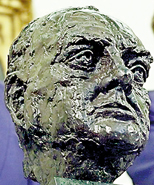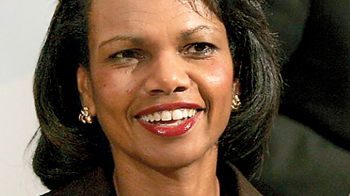Sunday Times 2
The battle for Churchill’s bust
NEW YORK – The election of the United States’ next president is surely the most important contest in the democratic world. Yet the issues being contested can seem awfully trivial. Consider, for instance, the question of Winston Churchill’s bust.
A bronze sculpture of the British prime minister had been in the Oval Office of the White House since the 1960′s. On becoming President, Barack Obama replaced it with a bust of Abraham Lincoln.

The controversial bust that has become a political hot potato
Mitt Romney, his Republican opponent in November’s election, has vowed to restore it if he wins. Then a White House spokesman said that the bust was still on the premises, just in a different room, whereupon the story changed once more: there were apparently two busts of Churchill; one still in the White House, and one that Obama returned to the British embassy.
Why would anyone care about this? One answer was provided by two of Mitt Romney’s advisers, who stated that their candidate particularly valued the “special relationship” with Britain because of the shared “Anglo-Saxon heritage.” This heritage, they claimed, was not sufficiently “appreciated” by the current president.
When this bizarre statement, with its racist undertones, threatened to become a scandal, Romney quickly distanced himself from it. He did not want to be seen as a racist. But how else is his peculiar nostalgia for Churchill’s bust to be understood?
In fact, the phrase “Anglo-Saxon” is not often heard any more in the US, where the majority of the population has not been of Anglo-Saxon origin for a long time (which is also true of Britain’s largest cities). When Americans use the term, it is usually to differentiate white Americans from the rest, which is not something that most Americans, least of all presidential candidates, would now choose to do in public.
“Anglo-Saxon” is more often used in a negative sense by the French, as in “Anglo-Saxon bankers” or “Anglo-Saxon conspiracies” (to keep the French down). Just recently Le Monde had the wonderful headline: “Hollande Defends French Foie Gras against Anglo-Saxon lobbies” (the reference was to California’s ban on foie gras under its animal-cruelty laws).
Even Churchill himself did not speak of Anglo-Saxons much. He talked about “the British race” or the “English-speaking peoples.” The so-called “special relationship” between Britain and the US, certainly prized by Churchill, was not so much racial as it was a product of World War II – and a rather complicated one at that.
During the war, Churchill and Roosevelt shared the idea that once Germany and Japan were defeated, British and US military forces should act as global policemen. They believed that the world would be safe from future Hitlers if it were, at least for some time, under the enlightened leadership of the democratic English-speaking peoples.
By the end of the war, however, Britain was too exhausted to police the world. The country was bankrupt and His Majesty’s colonial subjects were growing restive. The future belonged to the US and the Soviet Union, neither of which had sentimental feelings about the British Empire, let alone the “Anglo-Saxons.”
But the British elite, fully aware of their country’s decline, took the “special relationship” with the US very seriously, for it was the only way for Britain to feel like it was still a major power, unlike, say, France. They still do. Churchill certainly saw it that way, but so did Tony Blair, who presented President George W. Bush with the second Churchill bust.
Americans, on the whole, have far less interest than the British in the “special relationship.” But they are often sentimental about Churchill. He is the man whom many American presidents would like to emulate, not because of any racial affinities, but because of his allure as a wartime leader. The US is the strongest military power in the world, just as Britain was in Churchill’s youth. And, like British empire-builders in the past, US elites often claim a moral mission to remake the world in America’s image.
Churchill, in other words, became a symbol of presidential hubris in the US, even as the “special relationship” can be viewed as a symbol of British decline. People tend to forget that Rudyard Kipling’s famous poem about “the white man’s burden” was not an ode to the British Empire, but to the US colonial enterprise in the Philippines.
Too much power corrupts, as we all know. Hubristic presidents contemplating Churchill’s bust in their office are prone to believe that they have been called upon to be “war presidents” – that they, like Churchill in 1940, must oppose the next Hitler. This siren song drew the US into Vietnam, Afghanistan, and Iraq.
So, when Obama decided to remove Churchill’s bust from his office in 2008, this struck me as a very sensible gesture. A little less hubris would do the US, as well as the world, some good.But now Romney wants him back. Whatever else he might be, Romney does not come across as a convincing war leader. Businessmen rarely are. Yet he likes to portray himself as a tough patriot, and Obama as an un-American wimp.
Perhaps Romney wants another war, in which he can play Churchill. Or perhaps his two advisers were speaking the truth. Maybe Romney really is feeling sentimental about the “Anglo-Saxon heritage,” even as Asian power grows. If so, nostalgia for Churchill is hardly a sign of American vitality, but more like a romantic rearguard battle, typical of a country in decline.
Ian Buruma is Professor of Democracy and Human Rights at Bard College, and the author of Taming the Gods: Religion and Democracy on Three Continents.Copyright: Project Syndicate, 2012. Exclusive to the Sunday Times
comments powered by Disqus





















